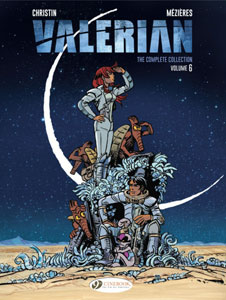Looking for a “Valerian” fix after last year’s movie, “Valerian and the City of a Thousand Planets,” I’m delving into the comics that started it all, by Frenchmen Pierre Christin (writer) and Jean-Claude Mezieres (pencils and inks). “The Complete Collection, Volume 6” includes “Hostages of Ultralum” (1996), “Orphan of the Stars” (1998) and “In Uncertain Times” (2001).
Volume 16: “Hostages of Ultralum” (1996)
In these three books, things get a little easier for V&L since they possess a Grumpy Transmuter from Bluxte and are therefore rich. It’s kind of odd that Laureline in particular doesn’t question the ethics of their manner of wealth creation. (“It’s not a crime being rich,” she says. Yeah, but counterfeiting is.) Even though our heroes don’t have to go from job to job “Firefly”-style, C&M continue to give them weighty missions. The bigger challenge for the creators is overcoming the addition of a child to the main cast. It’s certainly not so bad that “Valerian” jumps the shark, but it’s noticeable how much the Caliphette, the son of the mining industry kingpin, dominates this story.
Laureline, who gets accidentally kidnapped along with the Caliphette, is in her usual fine form as she works to convince the put-upon miners to unionize while also warming up to the initially annoying kid. With so many players in this game – including the Mortis Quartet (all-purpose android baddies who go on to serve a similar role in “Time Jam”), bungling conjoined twin cops and Valerian’s Schniarfor (a living weapon), this becomes a romp full of new and old characters. But I get a slight sense that Christin is running short on fresh ideas in the back half of the saga, as the central theme of workers’ rights is similar to “Birds of the Master.”
3.5 stars
Volume 17: “Orphan of the Stars” (1998)
There’s a fine line between “silly romp” and “grand adventure,” and because of the rapid-fire speed of this volume, it leans toward the former. However, it’s a step up from the previous book because Christin effectively parodies a variety of institutions, including academia and the entertainment industry, as V&L try to get the Caliphette safely stowed away at a good school.
A bizarre side trip finds Laureline cast in a romantic adventure from Paradise Studios, based in an asteroid field but serving as a stand-in for Hollywood. The producer, Ty Koun, sets up the deals so quickly V&L don’t know what hit them, and pretty soon Laureline is being positioned as a new starlet, wearing a bizarre jester’s costume. The “Time Jam” episode “It’s Showtime” would later do a more mainstream version of this idea where V&L are annoyed that they have been dumbed down on film. Here, Christin digs into the behind-the-camera machinations, including the put-upon screenwriter – likely a stand-in for himself — who is constantly being asked for new pages (although I thought C&M set their own publication schedule by this point in their careers).

4 stars
Volume 18: “In Uncertain Times” (2001)
This one is unquestionably a “crazy romp.” The end game is important to the saga, as we learn that two timelines are accessible: 1, the timeline where V&L reside, where Galaxity doesn’t exist and humans are not among the dominant species; and 2, Valerian’s home timeline, where the Earth capital, Galaxity, is the centerpiece of the cosmos. This timeline exists on the other side of a black hole.
En route to that revelation, Christin unleashes a sweeping parody of, well, everything. It’s centered on corporatism, via a company called Vivaxis that seeks to control everything. The Holy Trinity from “The Wrath of Hypsis” is back, along with L.C.F. Sat, who stands in for The Devil. If you keep in mind what all these characters represent metaphorically, “In Uncertain Times” reads better, but it’s still an over-the-top satire (if not necessarily off point).
Adding to the confusion, the story includes a lot of small instances of time travel, and while it’s fun to see characters from previous stories (almost every previous chapter is referenced here) – for example, Sun Rae from “The City of Shifting Waters” – a reader struggles to soak it all in. The story (purposely, granted) feels disjointed from time and space; it’s like we can’t set our feet on the ground. Still, if I can someday find a point-by-point explanation of all of Christin’s metaphorical stand-ins, my appreciation of this yarn will only go up.
3.5 stars
Click here for a complete index of “Valerian and Laureline” reviews.

